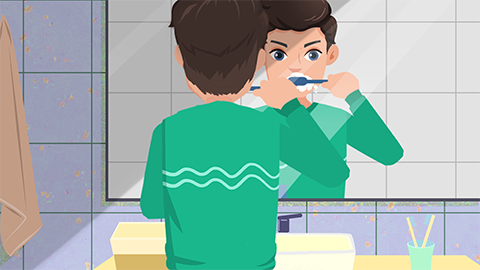What causes nausea, dry heaving, or feeling sick while brushing teeth?
Generally, nausea, dry heaving, or feeling sick while brushing teeth may be caused by improper brushing techniques, excessive toothpaste use, gastroesophageal reflux disease (GERD), sinusitis, chronic pharyngitis, or other factors. If discomfort persists, timely medical consultation is recommended. Detailed explanations are as follows:

1. Improper Brushing Technique
Brushing too hard, using a toothbrush with a large brush head, or inserting the brush too deeply into the mouth can stimulate the sensitive nerves of the posterior pharyngeal wall, triggering the pharyngeal reflex and causing nausea, dry heaving, or feeling sick. It is recommended to use proper brushing techniques, select a toothbrush with an appropriately sized brush head, and brush gently to avoid irritating the back of the throat.
2. Excessive Toothpaste Use
Using too much toothpaste can produce excessive foam in the mouth, irritating the oral cavity and throat, resulting in discomfort such as nausea, dry heaving, or feeling sick. It is recommended to control the amount of toothpaste used—approximately the size of a pea for adults and less for children depending on age.
3. Gastroesophageal Reflux Disease (GERD)
GERD may be caused by dysfunction of the lower esophageal sphincter. Stomach acid and gastric contents reflux into the esophagus, irritating the esophageal mucosa. Prolonged inflammation increases the sensitivity of the esophagus and throat, making nausea, dry heaving, or feeling sick more likely during tooth brushing. Symptoms such as heartburn, acid regurgitation, and retrosternal pain may also be present. Patients can take medications such as omeprazole enteric-coated capsules, domperidone tablets, or hydrotalcid chewable tablets under a doctor's guidance to alleviate symptoms.
4. Sinusitis
Sinusitis may be associated with upper respiratory tract infections or nasal conditions. Pus-like secretions from the sinuses may flow backward into the throat, irritating the pharyngeal mucosa and causing throat discomfort. This irritation may intensify during tooth brushing, leading to the aforementioned symptoms. Additional symptoms may include nasal congestion, runny nose, and headache. Patients should follow medical advice to use medications such as eucalyptol and limonene enteric-coated capsules, mometasone furoate nasal spray, or amoxicillin-clavulanate potassium tablets for treatment.
5. Chronic Pharyngitis
Chronic pharyngitis is often caused by recurrent acute pharyngitis, long-term unhealthy lifestyle habits, or environmental factors. The pharyngeal mucosa remains inflamed for a prolonged period, increasing its sensitivity. When stimulated during tooth brushing, symptoms such as nausea, dry heaving, or feeling sick may occur easily. Other symptoms may include a foreign body sensation in the throat, dryness, or itching. Patients can use medications such as compound borax mouthwash, watermelon frost tablets, or throat lozenges under medical supervision to relieve symptoms.
In daily life, maintaining good oral hygiene and replacing toothbrushes regularly is important. Eating regularly and avoiding overeating is also recommended. Keeping indoor air fresh and minimizing environmental irritants can further help prevent these symptoms.







